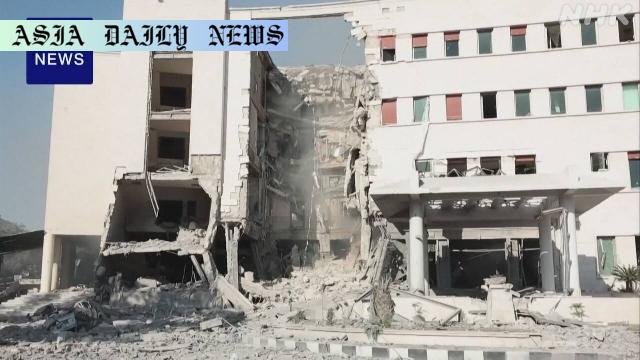Israel strikes southern Syria targeting armed groups post-Damascus airstrikes, escalating tensions amidst regional conflicts.
Israel targets military groups in southern Syria after airstrikes on Damascus.
The intervention claims to protect the Druze community near Israel’s borders.
The United States has expressed disapproval, urging a ceasefire.

Israel Launches Military Campaign in Syria
The Israeli Defense Forces (IDF) carried out airstrikes in southern Syria on Thursday, striking military positions following an operation targeting Damascus a day earlier. This move has sparked international concerns about further escalation in the region. According to Israeli Prime Minister Benjamin Netanyahu, the strikes were part of a broader strategy to ensure the security of the Druze minority, some of whom reside within Israel’s borders. The campaign also aims to push back potential armed threats roaming the southern border near Israel.
Targeting Armed Groups and Regional Impact
The recent military action reportedly targeted an unidentified armed Bedouin group located in the southern region of Syria. The Israeli efforts appear to be directed at preventing these groups from gaining traction or advancing toward Israel’s border. Netanyahu emphasized that Israel has adopted a strict policy of demilitarizing the area south of Damascus, aimed at mitigating risks posed by Syrian forces, tribal militias, and other armed factions. This approach has raised tension within an already volatile region, with fears that the strikes could exacerbate ongoing clashes within Syria.
US Reaction and Calls for Ceasefire
Despite Israel citing strategic motives, the United States has publicly criticized the recent military actions. In a statement shared with reporters, a spokesperson from the US State Department made it clear that the United States does not support Israel’s military operation. The spokesperson called for an immediate halt to hostilities, urging all involved parties to pursue peaceful resolutions instead of fueling conflict. This response highlights divisions in international perspectives on managing security threats in the Middle East.
Concerns Over Escalating Violence
The strikes come at a time when southern Syria is embroiled in internal clashes involving the Druze community and Bedouin tribes. The Syrian interim government has also mobilized its military to handle growing instability in the region. However, Israel’s military intervention has added a new layer to an already complex conflict, raising fears of further destabilization along its northern borders. Israeli officials have hinted at the possibility of additional measures if the situation is not resolved promptly, sending a strong signal to regional actors about their commitment to border security.
Looking Ahead: Potential for Escalation
As events unfold, there is growing concern about the long-term ramifications of Israel’s military strategy in Syria. While Netanyahu’s government has reinforced its commitment to national security, international observers are divided on whether these actions will lead to lasting stability or provoke a cycle of retaliation. The tension between Israel and Syria reflects broader regional struggles, where shifts in military power often ignite disputes that ripple across borders. Experts continue to monitor the situation as the international community calls for mutual restraint to avoid further escalation.
Commentary
Balancing National Security and Regional Stability
The recent Israeli strikes on southern Syria have once again placed the spotlight on one of the world’s most volatile regions. While Israel maintains that these military actions are necessary to safeguard its borders and protect the Druze minority, the larger context poses significant questions about the strategic balance in the Middle East. As the situation unfolds, it is critical to recognize the broader implications of such operations, both for Israel and its neighboring countries.
Regional and International Reactions
Prime Minister Netanyahu’s rhetoric underscores Israel’s commitment to maintaining a secure demilitarized zone near its northern borders. However, it is evident that not everyone approves of this approach. The United States, a long-standing ally of Israel, has openly criticized the strikes, emphasizing the need for diplomacy over military action. This divergence in opinion between allies hints at the complexities involved in addressing Middle Eastern conflicts, where delicate alliances often coexist with competing interests and policies.
The Risk of Escalation and the Need for Dialogue
What remains troubling is the potential for these events to spiral out of control. The southern Syrian region is mired in internal strife, and external interventions risk aggravating local grievances. Without careful diplomacy and coordinated international efforts, there is a genuine risk that this could become another prolonged flashpoint in the region. Moving forward, the focus should turn to creating platforms for open dialogue, inclusive peace initiatives, and partnerships that prioritize stability over domination.
Conclusion: Striking a Balance
Ultimately, Israel’s concerns about border security are valid, as are global concerns about the implications of unilateral military action. Striking a balance between these priorities will not be easy, but it is essential to ensure that interventions do not cause more harm than good. The situation calls for both immediate restraint and long-term vision, where all parties work toward de-escalation for the betterment of the entire region.


